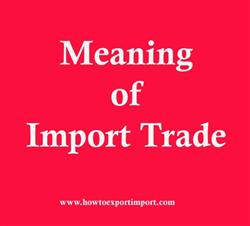What is Import Trade
The details about Import Trade are explained here.
Import Trade:
An import in the receiving country is an export from the sending country. Importation and exportation are the defining financial transactions of international trade. In international trade, the importation and exportation of goods are limited by import quotas and mandates from the customs authority
An import is a good brought into a jurisdiction, especially across a national border, from an external source. The party bringing in the good is called an importer. An import in the receiving country is an export from the sending country. Importation and exportation are the defining financial transactions of international trade.

In international trade, the importation and exportation of goods are limited by import quotas and mandates from the customs authority. The importing and exporting jurisdictions may impose a tariff (tax) on the goods. In addition, the importation and exportation of goods are subject to trade agreements between the importing and exporting jurisdictions.
"Imports" consist of transactions in goods and services to a resident of a jurisdiction (such as a nation) from non-residents. The exact definition of imports in national accounts includes and excludes specific "borderline" cases. A general delimitation of imports in national accounts is given below:
An import of a good occurs when there is a change of ownership from a non-resident to a resident; this does not necessarily imply that the good in question physically crosses the frontier. However, in specific cases national accounts impute changes of ownership even though in legal terms no change of ownership takes place (e.g. cross border financial leasing, cross border deliveries between affiliates of the same enterprise, goods crossing the border for significant processing to order or repair). Also smuggled goods must be included in the import measurement.
Imports of services consist of all services rendered by non-residents to residents. In national accounts any direct purchases by residents outside the economic territory of a country are recorded as imports of services; therefore all expenditure by tourists in the economic territory of another country are considered part of the imports of services. Also international flows of illegal services must be included.
Basic trade statistics often differ in terms of definition and coverage from the requirements in the national accounts:
Data on international trade in goods are mostly obtained through declarations to custom services. If a country applies the general trade system, all goods entering the country are recorded as imports. If the special trade system (e.g. extra-EU trade statistics) is applied goods which are received into customs warehouses are not recorded in external trade statistics unless they subsequently go into free circulation of the importing country.
A special case is the intra-EU trade statistics. Since goods move freely between the member states of the EU without customs controls, statistics on trade in goods between the member states must be obtained through surveys. To reduce the statistical burden on the respondents small scale traders are excluded from the reporting obligation.
Statistical recording of trade in services is based on declarations by banks to their central banks or by surveys of the main operators. In a globalized economy where services can be rendered via electronic means (e.g. internet) the related international flows of services are difficult to identify.
Basic statistics on international trade normally do not record smuggled goods or international flows of illegal services. A small fraction of the smuggled goods and illegal services may nevertheless be included in official trade statistics through dummy shipments or dummy declarations that serve to conceal the illegal nature of the activities.
The information on Import Trade is detailed above. Comment below your thoughts on Import Trade
Learn Exports Imports Free, Click here
Click here to know GST rate of your goods or service
Who receives the amount of auctioned / resold imported unclaimed/un-cleared goods?
Why demurrage/detention waiver period is required at destination for import
Why do carriers balance weight and volume while charging freight amount in Exports?
Why does Palletization require?
Why labeling and marking in Export business?
The term FCL. What is FCL means
How to Import to Kyrgyzstan?
How to export from Kyrgyzstan?
How to export from India to Kyrgyzstan?
Difference between types of goods and services and types of GST
4 types of Goods and Services in India for GST rate
Difference between IGST on International goods and IGST on domestic goods.
How is IGST calculated under Imports?
How is IGST rate on imports treated?
GST and e-Commerce Business, FAQ
Definition of E-Commerce under GST
TDS under GST, Frequently Asked Questions
Does Interest attract on GST Tax payment delay?
Mechanism of Payment of GST tax in India
Levy of late fee for GST Tax returns filing in India
Notice to GST return filing defaulters
When to file Annual Return of GST online?
Tax period under GST
Meaning of Tax Ledger under GST
Tax invoice under GST
What is Supply of Goods under GST